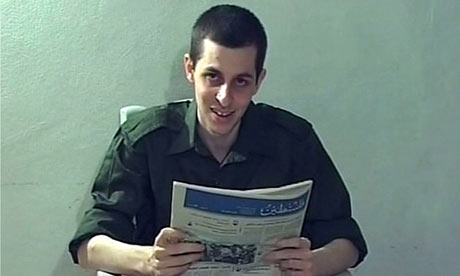The past few weeks we hear many reports about the possible release of Gilad Shalit as part of a prisoners swap of Israel with the Hamas. Maybe up to hundreds of Palestinian terrorists, with blood on their hands in killing innocent citizins of Israel, will be released as part of this swap in order to free Gilad Shalit. The difference in moral conduct and attitude between the negotiators (Israel and Hamas) can’t be expressed in a better way. Israel with the will and moral standard of saving one man: Gilad Shalit and Hamas with the vicious attitude of killing more jews and honouring those who did the job.
That Israel is struggling in this matter becomes quite clear when reading the following articles, but is there a choice?
Message of hope to killers
Massive prisoner release will give hope to every potential terrorist
by Alex Fishman
Published:
11.24.09 / Israel Opinion
We are not dealing with a swap that includes the release of prisoners with blood on their hands in exchange for Gilad Shalit. What we have here is the release of prisoners with blood up to their ears.
Hamas’ original list, which was rejected by the Olmert government, included 125 such names, which the State of Israel rejected out of hand, saying they will never be released. This included the murderers who planned the attacks at a Haifa restaurant, at the Park Hotel, at the Tel Aviv beachfront promenade, at a Jerusalem café and restaurant, and many others slated to stay in prison until they die.
We are talking about the release of dozens of heavy-duty terrorists who were each sentenced to several life sentences, and who carried out the most horrifying attacks.
And so, the dilemma faced by Prime Minister Netanyahu and his ministers today is the same dilemma: Is the State of Israel willing to release murderers, some of whom are military leaders seen as national symbols and serving as a model to members of the most radical Palestinian factions? People whose release will grant hope to every potential killer, by conveying a clear message: You can murder Jews. After all, eventually someone will secure your release.
Even if the German mediator is a magician, and even if at this very moment he is able to bridge the positions of both sides, the Shalit deal outline, as it is being presented these days by the Arab press, has fundamentally remained the same as it was during Olmert’s era.
Any way you look at it, Israel will be releasing 1,400 prisoners in exchange for Shalit: 450 based on Hamas’ list, another 550 as a gesture to Mahmoud Abbas and to Egyptian President Mubarak, and another 400 female detainees, teenagers, and parliament members under administrative detention.
And this is the second dilemma faced by the seven ministers looking into the Shalit affair: Is this the price the State of Israel needs, can, or wants to pay as result of the helplessness of its security agencies, which for three years were unable to secure information that could prompt Shalit’s release?
Desperate resuscitation attempts
The defense minister ordered the establishment of a committee in order to set rules that would oblige the State of Israel when facing the next abduction. The committee ruled that in the next swap, Israel will release one prisoner in exchange for one captive. In other words, the committee ruled that the Shalit swap is improper.
However, the committee’s conclusions will have no significance – either at present or in the future – as the Shalit deal will constitute the basis for any future negotiations. Just like the Shalit swap is premised on the precedent of the Jibril swap in 1995 and the Tannenbaum deal in 2004. In the Jibril Swap, three IDF soldiers were released in exchange for 1,150 terrorists, including 600 with blood on their hands. Later, 400 terrorists were released as part of the Tannenbaum deal.
The third dilemma is unique to the Netanyahu era. Should we see the mass release of prisoners, as described by foreign sources, Mahmoud Abbas can indeed go ahead and quit. Through this deal, the State of Israel is sentencing the Abbas government to death. At worst, this may lead to anarchy in the territories, while at best, we will see a revival among the radical camps within Fatah, which argue that there is no point in talking to Israel anyway and that violence pays off.
In order to compensate Abbas, and in order to try to keep his government in power in the wake of this blow, officials around here will have to come up with something along the lines of releasing hundreds of Fatah prisoners, significantly expanding the area under the Palestinian Authority’s control, a dramatic settlement construction halt, etc. Or in other words: Desperate resuscitation attempts.
And we have said nothing about Israel’s image in the world, and particularly in the Arab world, about domestic morale problems, and about a long list of other dilemmas faced by Netanyahu and his ministers.
There’s no other choice
Israel’s deterrence power cannot be placed on Gilad Shalit’s shoulders
by Sima Kadmon
Published:
11.23.09 / Israel Opinion
In recent days, ever since foreign reports surfaced about progress in the swap talks, our collective heart has been shifting between skepticism and hope. How could it be otherwise? So many times in the past they promised us that a deal is close to completion.
However, this time around the feeling is different. It appears that the moment of decision is truly here. Yet what appears to be taken for granted, an offer that cannot be refused, is apparently very far from being that way.
Political sources are saying that Netanyahu is far from being calm. He is concerned that the swap may not be endorsed should he present it to the government. Even in the most limited forum that is closely associated with him, the top seven government ministers, the situation is unclear.
Lieberman, Yaalon and Begin may vote against the swap, Netanyahu, Barak and Meridor will vote in favor, and Eli Yishai may hold the deciding vote. In the government, the situation is even worse: There, some Likud ministers will also be voting against the proposal. The above mentioned sources are saying that Netanyahu is seeking a forum (perhaps some kind of ministerial committee) that would guarantee a majority.
What is clear at this time already is that Netanyahu agreed to far-reaching concessions. Should the deal be carried out in line with the reported parameters, it would mean he went further than Olmert. The list that Olmert was working with contained 125 prisoners he refused to release. Netanyahu cut that number down to 70.
It won’t be simple
We already know the arguments to be presented by objectors to the deal: They will talk about capitulation to terror. They will say that the swap will be carried out in line with Hamas’ demands. They will note that Israel will now have to lift the siege on the Gaza Strip and argue that the deal weakens moderate Palestinians and boosts the radicals.
These arguments cannot be disparaged. They are all correct, and they are all disturbing, especially when the Mossad and Shin Bet chiefs will apparently object to the deal. Netanyahu will need all the help he can get; all the power that the public campaign can offer. And he’s got it: The Shalit family, the friends, the demonstrators, the tents, and the non-profit groups – in short, the Israeli public is on his side.
It will not be simple, a senior Likud minister said Sunday night. This is an issue that has the potential for conflagration, yet the moment the prime minister will throw his weight behind it, the deal will be endorsed.
What will this do to Netanyahu? From a prime minister who does not take decisions, he will turn into a PM that took a major and difficult decision that is proper and unavoidable. We cannot place all of our deterrence power and national strength on the shoulders of one soldier. Bring him back home already.
An image of weakness
Shalit deal shows our enemies we’re not cut out for Mideast’s rough existence.
by Mordechi Kedar
Published:
11.24.09 / Israel Opinion
The question that emerges in earnest at this time, when Gilad Shalit’s freedom is on the line, is whether his release through capitulation to Hamas’ conditions will in all likelihood prompt more abductions in the future.
In the name of which set of morals should we choose Gilad Shalit’s life over the lives of people to be abducted in the future because of the surrender that prompted his release? And once all prisoners demanded by Hamas will be released, how many of our citizens will be murdered? Is each one of those calling for securing Shalit’s release “at any price” willing to pay that price personally when they are murdered, heaven forbid, by a released detainee? And what will we be paying for abductees in the future? A Jerusalem neighborhood in exchange for a solider and half a neighborhood for a civilian?
A greater problem is the fact that people who abduct Israelis are going on with their lives while feeling nothing bad will happen to them and that they won’t have to pay any price for their acts. Only once in history did abductors of Israelis have to pay with their lives for the abduction: The kidnappers of the Israeli athletes at the 1972 Munich Olympics, apparently because the captives were murdered.
The Hamas leaders who hold Gilad Shalit are sleeping in their beds, sitting in their offices, and traveling worldwide as if there is nothing wrong with their acts and conduct. On Monday, the man who abducted Shalit and is holding him, Ahmad Jabri, traveled to Egypt while realizing that an IDF drone is flying above his car. The State of Israel no longer scares anyone, and many in the Arab world feel that they can do anything against it, without paying any price for their actions, as grave as these may be.
No place for European-style guests
The people of Israel are perceived by their neighbors and enemies as an impatient nation that wants everything now; a nation that has no ability to sustain the pains of living in the poverty-stricken, hungry, thirsty, sick, split, and radical environment that surrounds it. Our enemies know that such nation cannot survive in the oh-so-ancient Mideast, where the Shiites are still fighting for control of Islam 1,400 years after it was wrested away from them, and where terms like democracy, human rights, minority rights, liberty of women, and religious freedom are a distant dream; much more distant than our lack of endurance.
The pathetically submissive image of the people of Israel encourages more abductions and boosts the psychological pressure exerted on us by our neighbors. They are unimpressed with the hollow slogans uttered by our bleeding hearts, such as “our advantage is our morality” or “concern for our soldiers is above all.” They perceive it as a sign of skewed and crazy priorities, as the increasingly privatized Israel prefers the life of one soldier over national interests. They view it as emotional weakness. A nation that acts and feels that way will not survive here over time.
Only a nation instilled with ideology and possessing a collective sense of mission and confidence in its righteousness, feeling that it is part of a just historical process and willing to pay and suffer the price of survival in blood, sweat and tears can survive in the Mideast. This region is not a place for European-style guests, who lost the willingness to fight for their freedom and pay for it in the blood.
And what will happen should I be abducted? I hereby order all readers to secure my release in exchange for one person only; a person just like me and no more: A 57-year-old academician and lecturer with no tenure. You can trade me for less, but certainly not for more.
Hamas offers 1.4 million dollar to any Arab citizin who captures an IDF soldier.
Published: november 18, 2009
A Gaza charity headed by the interior minister of the militant Hamas group on Wednesday offered $1.4 million to any Arab citizen of Israel who abducts a soldier. Original article here or ynews.net
Palestinians have frequently called on Israeli Arabs to abduct Israeli soldiers, but this is the first time that money has been offered.
The Waad group from Gaza offered the bounty for Israeli soldiers in an e-mail sent to Palestinian media. The organization, which supports Palestinian prisoners held by Israel, is headed by Hamas’ Interior Minister Fathi Hamad. The minister did not return messages seeking comment.
The charity could presumably raise the cash through its connections with Hamas. The militant group is thought to have millions of dollars at its disposal, both through its tight control of Gaza and support from Iran and other allies.
Waad’s director, Usama Kahlout, said the bounty was in response to an Israeli group’s offer to pay Gaza residents for information on the whereabouts of Sgt. Gilad Shalit, an Israeli soldier captured more than three years ago by Hamas-allied militants.
Mazzeltov,
Crethi Plethi



 RSS
RSS













New article #crethiplethi.com about the choice between #humanity and #justice http://bit.ly/6GcHaG
New article #crethiplethi.com about the choice between #humanity and #justice http://bit.ly/6GcHaG